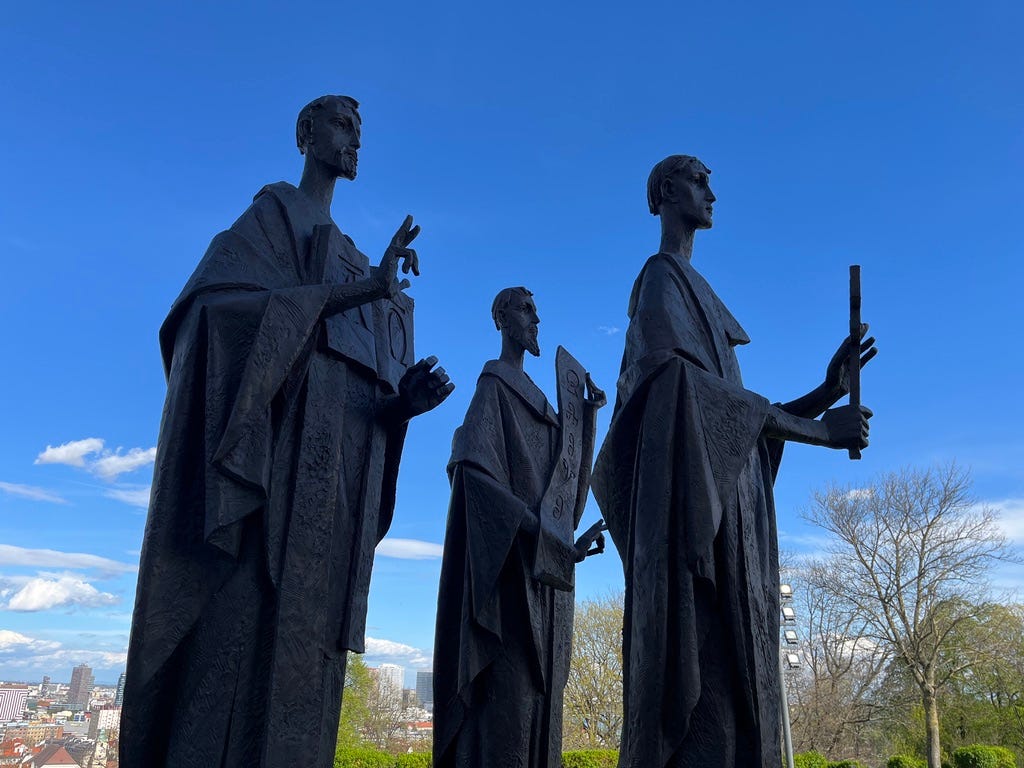I’ve just returned from my annual bicycle and camping trip with friends. Once a year a small group of guys who have known each other for forty-five years gathers at a secret undisclosed location. We camp or increasingly glamp, ride bikes and spend a week telling stories, discussing all manner of topics. I’ve written about this elsewhere, as a testimony to the power and need for men to gather. Each time I realize how important it is for me to participate in this ritual. Like others, I need friends.
Friendships are as old as humanity, and the stories of friends, especially among men, permeate ancient religious literature.
Friendship is the Basis for Human Community
From the earliest moments of human civilization, friendship has been a fundamental thread weaving together society. In the Hebrew Bible, the relationship between David and Jonathan stands as a profound example of deep human connection. Their bond is described in the First Book of Samuel as transcending blood ties, with Jonathan loving David "as his own soul," illustrating how true friendship can forge connections more potent than those of familial or tribal boundaries.
Ancient Greek philosophy further illuminated the communal significance of friendship. Aristotle viewed friendship as essential to the polis, arguing that human beings are fundamentally social creatures who can only fully realize their potential through meaningful relationships. The Greek concept of philia encompassed a broader understanding of friendship than our modern notion, recognizing it as a crucial element of ethical and political life.
Friendship Helps Shape an Ethical Life
Literary traditions across cultures have consistently portrayed friendship as a transformative moral force. In John Steinbeck's "Of Mice and Men," the relationship between George and Lennie demonstrates how friendship can elevate human compassion and moral responsibility. George's protective care for Lennie, despite the latter's intellectual limitations, reveals that true friendship demands empathy, sacrifice, and a commitment to another's well-being.
Religious texts offer similar insights, suggesting that authentic friendship transcends convenience and requires steadfast support during life's most challenging moments. The Quran similarly emphasizes the moral dimension of friendship, describing true companions as those who guide each other toward righteousness and compassion.
Friendship Can Mirror Our Relationship with God
Perhaps the most profound understanding of friendship emerges when we consider its spiritual dimensions. In the Gospel of John, Jesus dramatically redefines friendship in divine terms, telling his disciples, "I no longer call you servants... Instead, I have called you friends" (John 15:15). This revolutionary concept suggests that divine love manifests through deep, reciprocal human connections.
Sufi mystical poetry, particularly the works of Rumi, explores friendship as a metaphor for spiritual connection. Rumi frequently describes human friendship as a reflection of divine love, suggesting that our most profound human connections are glimpses of a larger, more transcendent relationship with the divine.
The ancient Hindu text, the Bhagavad Gita, similarly portrays friendship as a spiritual practice. Krishna's relationship with Arjuna is not merely a strategic alliance but a profound spiritual mentorship, demonstrating how true friendship can be a path to deeper understanding of oneself and the divine.
Ultimately, friendship represents more than mere social convenience. It is a complex and multifaceted experience that connects us to our community, shapes our ethical understanding, and offers a mirror to divine love. Through friendship, we learn the most fundamental lessons of human existence: compassion, sacrifice, understanding, and connection.
My small group of friends isn’t as profound as some of the figures in this essay. Sometimes we are rather silly and trivial. Yet, occasionally, a moment of depth breaks through, and we surprise ourselves. Perhaps more than anything, our annual trip provides a context in which to share our lives, our hurts, our joys, and our sorrows. That alone makes it worthwhile.
More to Come
Some News
Today, my new book “Through New Eyes” is released. We’ve almost sold out of the first print run. You can order a copy here.
Here’s the summary: In this photographic collection, James Hazelwood documents a twelve-year pilgrimage through the Holy Land, presenting 34 photographs that capture the landscape and people of Israel and Palestine from 2012 to 2024. Personal reflections by seven travelers delve into the region's spiritual depth and political complexity, challenging preconceptions and inviting viewers to engage with the intricate intersections of sacred spaces, contemporary tensions, and the multiple narratives that coexist in this historically charged territory.
As some of you know, I’ve launched a second substack to focus on my photography projects. If you have not already subscribed, I invite you to do so. The photo essays contain images from my documentary photography work and travels. Check it out here
Travel Plans
My wife and I are headed out for a month of travel in Europe next week. She’s on a mini-sabbatical from work, and I’m on a permanent sabbatical. This likely means you won't see a Substack Notebooks essay until June, but who knows, maybe I’ll find time to jot down some notes from along the Danube. This trip is a continuation of last fall’s Bicycling with the Saints and Sinners. We’ll be hanging out with the likes of Sigmund Freud, Vlad the Impaler, and Cyril and Methodius – what a crowd.
James Hazelwood is an author and photographer exploring the intersection of the sacred and the ordinary. His website is www.jameshazelwood.net










I’m glad to be your friend!